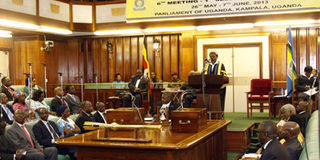EAC ministers call for slashing of EALA members

The East African Legislative Assembly [EALA] 6th Meeting of the 1st Session of the3rd Assembly that took place in Kampala from 26th May to 7th June 2013. Photo by Morgan Mbabazi
Regional ministers have proposed reducing the number of East African Legislative Assembly (EALA) members elected from each partner state from nine to five, as a budget crunch bites the bloc.
The proposal comes after the 12th meeting of the Sectoral Council of Ministers of Finance and Economic/Trade Affairs that began yesterday.
A report presented to the Council shows that EALA has the highest number of sittings among all benchmarked peer regional parliamentary assemblies, making it the most expensive to run.
EALA spends the largest share of the partner states’ contributions at 35.35 percent, followed closely by the Secretariat at 35.16 percent and the East Africa Court of Justice at 7.06 percent.
The report also recommended that the number of EALA sittings be reduced to four per financial year, like its benchmarked peers, so as to reduce costs.
“That proposal is misplaced because the composition of the assembly is a treaty matter,” said Rose Akol, a member of EALA from Uganda.
EALA lawmakers slammed the report, arguing that the parliament has been a model for other regional blocs.
“The success is because EAC (East African Community) has an organ that does checks and balances. It also boasts well-established organs and institutions. So, to us, that proposal is ill-advised,” said Aden Abdikadir, an EALA member from Kenya.
“As it is, this assembly is a model in the continent. Southern African Development Community (SADC) members were here on a fact-finding mission.”
Each EAC state is represented in the regional parliament by nine members, who serve not more than two terms of five years each.
“EALA members are paid a monthly salary plus a sitting allowance. Instead, if they are seconded from Partner States National Assemblies, they will only earn a sitting allowance during the period they are required as is the case in other RECS such as SADC and Economic Community of West African States (ECOWAS),” part of the proposal says.
The report also says the EALA’s mode of operation mirrors that of sovereign states, with powers to make its own rules of procedure and to create committees.
In composition, EALA has the highest number of members per country compared with the AU Pan-African Parliament, SADC Parliamentary Forum, Ecowas Parliament, Network of Parliamentarians of Central Africa and Arab Inter-Parliamentary Union.
“One of the reasons they are jumping on the powers and the strength of the assembly is our role in terms of carrying out oversight in the community. So we see this as a fight-back because the community’s funds have been misappropriated,” said Paul Musamali, an EALA member from Uganda.




